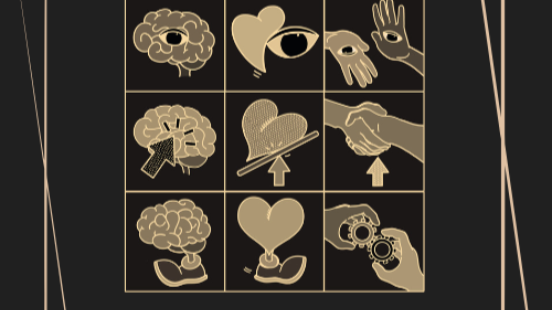Competency 13 - Regulating Stress in Daily Life
Transforming Conflict into Growth:
Emotional Competencies: Stress Management
Specific Competency: Regulating Stress in Daily Life
Statement: Regulating stress in daily life involves recognising stressors and applying effective strategies to manage and reduce stress levels. This competency is essential for maintaining overall well-being and productivity.
Introduction
Understanding and managing emotions (Competencies 9-12) lay the foundation for effectively regulating stress. Daily life presents numerous stressors, and learning how to cope with them is crucial for maintaining mental and physical health. Let’s explore practical ways to regulate stress.
The Science of Stress
Stress triggers a physiological response in the body, releasing hormones like cortisol and adrenaline. These hormones prepare us for a fight-or-flight response, causing physical symptoms such as increased heart rate, muscle tension, and heightened alertness. While this response can be beneficial in short bursts, chronic stress can lead to health issues like anxiety, depression, and cardiovascular problems.
Part A: Start By Yourself
Objective: Develop the skill of regulating stress by identifying stressors and applying stress-reduction techniques.
Instructions:
A) Identify Your Stressors:
- Reflect on Recent Situations: Think about recent situations that caused you stress. Write down the situation, what triggered your stress, and how you felt physically and emotionally.
- Recognise Patterns: Look for patterns in your stressors. Are there common themes or triggers that consistently cause you stress? Write these down.
B) Practice Stress-Reduction Techniques:
- Use the Grounding Exercise from Competency 12: Remember the grounding technique you learned earlier. It can be particularly beneficial in moments of acute stress to bring yourself back to the present moment.
- New Quick Stress-Reduction Technique:
- My SSSTOPPPP Exercise:
Identify your current emotional stress state.
S: Stand UP.
S: Shake your body and stretch from top to toe.
S: Sit Down.
T: Breathe with your nose.
O: Observe what you see, hear, taste, and feel.
P: Plan and Define how you want to feel.
P: Prepare a plan on what needs to happen to feel that way.
P: Proceed with your preparation.
P: Pulse 3 hours later and journal on how it went.
For a detailed explanation, see my Forbes article: How To Stop Being Mind Full And Start Being Mindful.
- Visualisation Exercise:Close your eyes and imagine a place where you feel completely relaxed. This could be a beach, a forest, or a quiet room.Visualise all the details: what you see, hear, smell, and feel. Spend a few minutes in this place until you feel calmer.
C) Journaling and some alternatives:
- Journaling: Journaling is an excellent way to document and reflect on your stressors and how you manage them.
- Voice Notes: Use your phone to record voice notes about your stressful situations and how you managed them. Reflect on what worked well and what could be improved.
- Artistic Expression: Draw, paint, or use another form of artistic expression to represent your stress and how you are managing it.
- Physical Activity: Engage in a physical activity you enjoy, such as walking, running, or dancing, and use this time to reflect on your stress and how you manage it.
Benefits:
- Reduces physical symptoms of stress.
- Enhances emotional resilience.
- Improves overall mental health and well-being.
Part B: Share with Pairs, Family, or Friends
Objective: Develop the skill of regulating stress together by practising stress-reduction techniques as a group.
Instructions:
A) In Pairs or Groups:
- Practice the SSSTOPPPP Exercise Together:
- Share Your Experiences: Discuss how you felt before and after the exercise. Share your observations and any changes in your emotional state.
B) Support Each Other:
- Help Each Other Plan and Prepare: Assist each other in planning and preparing for how you want to feel. Provide suggestions and support for implementing your plans.
- Encourage and Motivate: Encourage each other to proceed with the plans and provide motivation to stick with them.
C) Pulse and Reflect Together:
- Pulse 3 Hours Later: Check in with each other three hours after the exercise. Discuss how your plans worked out and whether you achieved the desired emotional state.
- Reflect on Learnings: Reflect on what you learned from the exercise and how it helped in managing stress. Share insights and feedback to improve future practices.
Tips:
- Foster a supportive and non-judgemental atmosphere during stress regulation discussions and activities.
- Be open to feedback and suggestions from others. For more on creating a feedback culture, see my Forbes article: Steps to Create a Successful Feedback Culture.
- Explore various stress-reduction techniques, such as progressive muscle relaxation, mindfulness meditation, and physical activity. Read more about these techniques in the article on Stress Management Strategies.
- Celebrate each other’s progress and efforts in managing stress positively.
Benefits:
- Promotes mutual understanding and support.
- Enhances emotional intelligence and resilience.
- Strengthens relationships through shared stress regulation practices.
Join the Journey By integrating these competencies into your daily life, you can improve your mental health, build stronger relationships, and better handle life's challenges. Stay tuned for the next set of emotional competencies!
Want to take it further, reach out and let's talk ;-)
Let'st work together, book me or my team for coaching, keynotes, training and consulting.
In the meantime,
Take care,
Krumma
PS: click here for the free mental fitness app that might change your life and your relationships https://positive-performances.passion.io/











